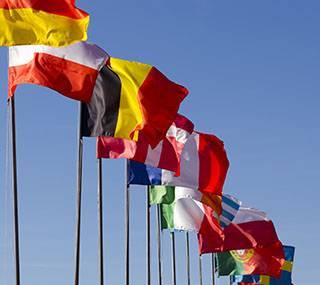Participation in international bodies
International collaboration is vital in ensuring that patients can access high-quality, safe and effective medicines and medical devices, regardless of where they are manufactured and how they have been authorised. To this end, ANSM is heavily involved in European and international projects, promoting France’s expertise and position in the discussions held and decisions made.
All medicine-related activities are coordinated within the ANSM’s Directorate for Europe and Innovation (DEI) (dedicated to coordinate European strategy): the hub for Centralised Procedure Management and European Relations.
Cooperation with agencies in the European network
ANSM is a member of the Heads of Medicines Agencies (HMA), and works together with the European Medicines Agency (EMA) and the European Commission.ANSM attends the plenary meetings of the EMA Management Board and the HMA network organised on a rotating basis by the Presidency of the Council of the European Union.
ANSM is represented on the following EMA committees:
Committee for Advanced Therapies (CAT)
This multidisciplinary committee is responsible for assessing the quality, safety and efficacy of innovative therapy medicines (somatic cell therapy, gene therapy, products derived from tissue engineering) within the framework of the centralised authorisation procedure, and prepares a draft opinion submitted to the CHMP for final approval. It also issues an opinion on the classification of innovative therapy medicines, takes part in the certification of quality and non-clinical data for small and medium-sized businesses developing innovative therapy medicines, contributes to scientific opinions on innovative therapy medicines, and monitors scientific developments in the field.
Go to the CAT’s official page
Go to the CAT’s official page
Committee for Medicinal Products for Human Use (CHMP)
This committee, which meets every month, is responsible for assessing medicines within the framework of the centralised procedure, which makes it possible to obtain a single MA (marketing authorisation), valid for all the countries in the European Union. Each Member State participates in the CHMP. The committee issues opinions forming the basis of European Commission decisions.
Read CHMP opinions
Go to the CHMP’s official page
Read CHMP opinions
Go to the CHMP’s official page
Committee for Orphan Medicinal Products (COMP)
This committee reviews registration applications for orphan medicines aimed at treating rare or orphan diseases (serious diseases with an incidence of less than 5 cases per 10,000 individuals in the European Union). The COMP also advises the European Commission on its orphan medicine policy.
Go to the COMP’s official page
Go to the COMP’s official page
Herbal Medicinal Products Committee (HMPC)
This committee facilitates harmonised registration and authorisation of herbal medicines by all Member States. It is tasked with drafting community herbal monographs and the community list of herbal preparations or substances.
Go to the HMPC’s official page
Go to the HMPC’s official page
Paediatric Committee (PDCO)
This committee is responsible for coordinating activities relative to paediatric medicines within the EMA. It is particularly responsible for assessing PIPs (paediatric investigation plans), which determine the paediatric studies required to authorise a medicine. It is also tasked with ensuring compliance with the studies and measures decided within the framework of the PIP.
The French representative, Sylvie Benchetrit, was elected Vice Chair of this committee for 3 years from September 2025.
Read PDCO opinions
Go to the PDCO’s official page
The French representative, Sylvie Benchetrit, was elected Vice Chair of this committee for 3 years from September 2025.
Read PDCO opinions
Go to the PDCO’s official page
Pharmacovigilance Risk Assessment Committee (PRAC)
This committee, which meets every month, covers all aspects of risk management associated with the use of medicines, in particular the detection, assessment, reduction and communication of risks associated with adverse reactions. Its members include representatives of Member States, experts appointed by the European Commission, and health professional and patient association representatives. The PRAC issues recommendations forming the basis of the positions adopted by the CHMP and CMDh.
Read PRAC opinions
Go to the PRAC’s official page
Read PRAC opinions
Go to the PRAC’s official page
Scientific Advice Working Party (SAWP)
The Scientific Advice Working Party (SAWP) is a working group of the CHMP tasked with providing scientific opinions on medicine developments or on investigation techniques useful for these developments, in order to facilitate access to safe and effective medicines.
Go to the SAWP’s official page
Go to the SAWP’s official page
ANSM is represented on the following HMA committees:
Heads of Medicines Agencies (HMA)
The HMA (Heads of Medicines Agencies) network is a regulatory network bringing together all the heads of the organisations responsible for the regulation of medicinal products for human and veterinary use in the European Economic Area. The HMA cooperates with the European Medicines Agency (EMA) and the European Commission in the operation of the European Medicines Regulatory Network (EMRN).
In particular, the HMA addresses key strategic issues, such as:
In particular, the HMA addresses key strategic issues, such as:
- the exchange of information, IT developments and sharing of best practices;
- optimisation of the European system for the regulation of medicinal products for human and veterinary use;
- the most effective and efficient use of resources across the network, with management of work-sharing;
- the coordination of mutual recognition procedure (MRP) and decentralised procedures (DCP).
Coordination Group for Mutual Recognition and Decentralised Procedures - Human (CMDh)
ANSM is represented in the HMA network’s Coordination Group for Mutual Recognition and Decentralised Procedures - Human (CMDh).
The CMDh is tasked with reviewing any question relating to the marketing authorisation of a medicine in several Member States according to the mutual recognition procedure or the decentralised registration procedure.
Go to the CMDh’s official page
The CMDh is tasked with reviewing any question relating to the marketing authorisation of a medicine in several Member States according to the mutual recognition procedure or the decentralised registration procedure.
Go to the CMDh’s official page
Clinical Trials Coordination Group (CTCG)
The main objective of the CTCG is to reinforce the harmonisation, coordination and transparency of clinical trials between Member States.
Go to the CTCG’s official page
Go to the CTCG’s official page
Emacolex working group
Emacolex (European Medicines Agencies Co-operation of Legal and Legislative Issues) is a working group that brings together legal and regulatory experts from competent national authorities in the European Union, along with representatives from the European Medicines Agency and the European Commission. The aim of this group is to enable dialogue and cooperation between Member States on legal and legislative matters.
Go to the Emacolex’s official page
Go to the Emacolex’s official page
Homeopathic Medicinal Products Working Group (HMPWG)
The HMPWG (Homeopathic Medicinal Products Working Group) is a committee dedicated to homeopathic medicinal products for human and veterinary use. Its mandate is to create a forum for exchange and expert assessment relating to the quality, safety and homeopathic use of these medicinal products. It develops guidelines and scientific guidance documents enabling safe use of homeopathic medicines. It facilitates European regulatory and scientific harmonisation of marketing authorisations and registrations for these medicinal products.
Go to the HMPWG’s official page
Go to the HMPWG’s official page
Working Group of Communications Professionals (WGCP)
The objective of the WGCP (Working Group of Communications Professionals) is to create a network between the communications professionals of the competent national authorities of the 27 Member States of the EU, the European Medicines Agency and the European Commission in order to share best practices and help coordinate communications in a crisis. Since 2019, the working group’s topics for discussion have also included medical devices.
Go to the WGCP’s official page
Go to the WGCP’s official page
Working Group of Enforcement Officers (WGEO)
The WGEO (Working Group of Enforcement Officers) is made up of representatives from the regulatory agencies responsible for human and veterinary medicines and the police and customs authorities of the 27 Member States of the EU and the three Member States of the European Economic Area, as well as observer countries. The European Medicines Agency, the European Commission, the Council of Europe (EDQM), WHO, Interpol, Europol and the Pharmaceutical Security Institute (PSI) also participate in the working group.
The aim of the WGEO is to promote communication and cooperation between its members by sharing information. Working subgroups exist focusing on different topics, such as falsified medicines, the online sale of medicines, wholesale distribution, and training.
Go to the WGEO’s official page
The aim of the WGEO is to promote communication and cooperation between its members by sharing information. Working subgroups exist focusing on different topics, such as falsified medicines, the online sale of medicines, wholesale distribution, and training.
Go to the WGEO’s official page
In the Working Group of Quality Managers (WGQM)
The objective of the WGQM (Working Group of Quality Managers) is to provide guidance relating to quality management and contribute to the development of best practices within the network of European agencies.
Go to the WGQM’s official page
Go to the WGQM’s official page
ANSM is also a member of the following European bodies:
European Network of Competent Authorities for Medical Devices (CAMD)
The objective of the CAMD is to enhance collaborative work, communication, coordination and surveillance pertaining to medical devices across Europe.
Go to the CAMD’s official page
Go to the CAMD’s official page
Medical Device Coordination Group (MDCG)
ANSM contributes to the work conducted by the MDCG particularly in terms of drafting common orientations, standards, and specifications for effective application of European regulations.
Go to the MDCG’s work
Go to the MDCG’s work
European Directorate for the Quality of Medicines & HealthCare (EDQM) of the Council of Europe
The primary activity of this body consists of drafting official standards pertaining to the manufacture and quality control of medicines. The EDQM coordinates the Official Medicines Control Laboratories (OMCL) network, which includes ANSM’s laboratories.
Go to the EQSM’s official page
Go to the EQSM’s official page
Cooperation between international agencies
Some ten collaboration protocols have been signed by ANSM and its international counterparts for the exchange of information covering all regulated products.ANSM is a member of the International Coalition of Medicines Regulatory Authorities (ICMRA), which is an international collective of heads of drug regulatory agencies. It began meeting annually under the impetus of the US-FDA in 2006 as part of a policy of developing openness, in order to share experience of common issues, and pool approaches to global health challenges and public health protection issues.
ICMRA aims to facilitate interactions, identify synergies, and optimise the benefits of existing initiatives, tools and resources in order to enable regulators of medicines to exercise collective and collaborative strategic leadership in international bodies such as the ICH (International Council for Harmonization), IPRP (International Pharmaceutical Regulators Programme), IMDRF (International Medical Device Regulators Forum), PIC/S (Pharmaceutical Inspection Co-operation Scheme), and the APEC (Asia-Pacific Economic Cooperation) forum.


